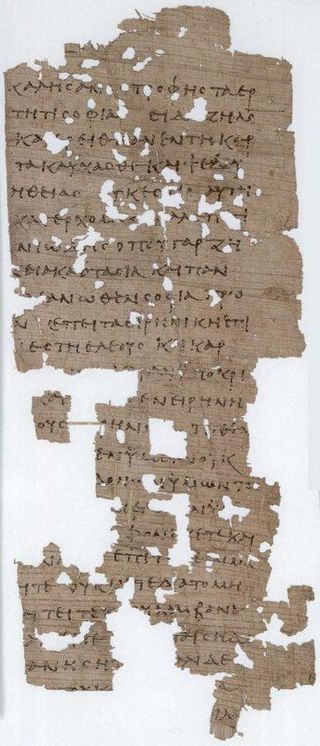| Change to Book/Chapter View |
|
|
|
Translation process is ongoing. For current status see details |
|
|

Papyrus 100 Date: Late Third or Early Fourth Century A.D. Discovered: Oxyrhynchus, Egypt Location: Ashmolean Museum Contents: James 3:13-4:4, 9-5:1
James 3 13 Who is wise and understanding among you? Let him show by his good conduct that his deeds are done in gentleness of wisdom. 14 But if you have bitter jealousy and selfish ambition in your heart, donít boast and donít lie against the truth. 15 This wisdom is not that which comes down from above, but is earthly, sensual, and demonic. 16 For where jealousy and selfish ambition are, there is confusion and every evil deed. 17 But the wisdom that is from above is first pure, then peaceful, gentle, reasonable, full of mercy and good fruits, without partiality, and without hypocrisy. 18 Now the fruit of righteousness is sown in peace by those who make peace.
James 4 Where do wars and fightings among you come from?
Donít they come from your pleasures
that war in your members? 2 You
lust, and donít have. You murder and covet, and canít obtain.
You fight and make war. You donít have, because you
donít ask. 3 You ask, and
donít receive, because you ask with wrong motives, so that you may spend it on your pleasures. 4 You [..] 9 Lament, mourn, and weep. Let your laughter be turned to mourning, and your joy to gloom. 10 Humble yourselves in the sight of the Lord, and he will exalt you. 11 Donít speak against one another, brothers. He who speaks against a brother and judges his brother, speaks against the law and judges the law. But if you judge the law, you are not a doer of the law, but a judge. 12 Only one is the lawgiver and judge, who is able to save and to destroy. But who are you to judge another? 13 Come now, you who say, ďToday or tomorrow letís go into this city, and spend a year there, trade, and make a profit.Ē 14 Whereas you donít know what your life will be like tomorrow. For what is your life? For you are a vapor that appears for a little time, and then vanishes away. 15 For you ought to say, ďIf the Lord wills, we will both live, and do this or that.Ē 16 But now you glory in your boasting. All such boasting is evil. 17 To him therefore who knows to do good, and doesnít do it, to him it is sin.
James 5 Come now, you rich, weep and howl for your miseries that are coming on you. |
How to read these pages: ē The
translation to the left is based on the World English Bible. Words in regular
black font are words in the manuscript matching the Majority Text for that
passage. ē Words
in italics cannot be seen in the manuscript, since the manuscript is
fragmentary. These words are supplied for readability by the World English
Bible translation. ē Words
present in the manuscript but with some letters unreadable or missing are in blue
like this: blue. One Greek word often is
translated into multiple English words, and when this occurs, all the English
words are in blue. ē Words
present in the manuscript but with spelling or trivial word order differences that do not affect the
meaning are in green like this: green. ē If
the manuscript is different from the Majority Text, words in the Majority
Text that are missing from the text of the manuscript are marked through in red
like this: ē If the manuscript is different from the Majority Text, words in the manuscript that are not in the Majority Text are underlined in red like this: new words.If the manuscript differs from the Majority Text yet matches another well-known text, this is noted in the footnotes.
|
